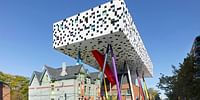- The Department offers a graduate program leading to the degree of M.Sc. and is tailored to fit the needs and backgrounds of individual students.
- The primary goal of this program is to provide students with unique opportunities to learn experimental designs and fundamental research techniques and objectively synthesize information from the scientific literature.
- Basic research discoveries in microbiology may lead to improved drug design and vaccine development to treat and prevent diseases.
- The Department has many notable facilities and resources, including a cell sorter, ultra-centrifuges, confocal microscope, real-time PCR facilities, cryostat for immunocytochemistry, and facilities for radio-isotope studies and infectious diseases.
- Students need a total of 45 credits to complete the program; Thesis Courses (33 credits), required courses (6 credits), and complementary courses (6 credits).
Master of Science [M.S] (Microbiology and Immunology)
2 years
On Campus
English
Field of Study:
#Ranked 169 out of 250 by US News Global Ranking 2022
₹17.3 L/Yr
CA$28,209 /Yr
Important Dates
| Event | Start Date | End Date |
| Application Deadline For Summer 2023 Intake | - | Jan 6, 2023 |
| Application Deadline For Fall 2023 Intake | - | Apr 22, 2023 |
| Application Deadline For Winter 2024 Intake | Feb 15, 2023 | Sep 1, 2023 |
| Application Deadline For Summer 2024 Intake | May 15, 2023 | Jan 6, 2024 |
Fees & Funding
Tution & Application Fees
| Year | Year 1 |
| Tuition Fees | ₹1658414 |
| Health Insurance | ₹73619 |
| Total Fees | ₹1732033 |
Living Costs
| Head | Avg Cost Per Year |
| Housing and Food | ₹635490 |
| Transportation | ₹46971 |
Eligibility & Entry Requirement
Academic Eligibility:
- Applicants must hold a B.Sc. degree in microbiology and immunology, biology, biochemistry, or another related discipline; those with the M.D., D.D.S., or D.V.M. degrees are also eligible to apply.
- The university degree, described above, must have been completed with a minimum cumulative grade point average (CGPA) for acceptance into the program is 3.2 out of 4.0.
Indian Student Eligibility:
- Applicants must hold a B.Sc. degree in microbiology and immunology, biology, biochemistry, or another related discipline; those with the M.D., D.D.S., or D.V.M. degrees are also eligible to apply from institutions with a NAAC rating of “A”.
- The university degree, described above, must have been completed with a minimum standing of 3.3/4.0 or the equivalent, according to the grading scale on the transcript.
- Along with the minimum eligibility requirements, international students hailing from non-English speaking countries need to prove English proficiency through IELTS/TOEFL/any equivalent test.
Scores Required
Required Document List
Followings are the required documents:
- Official Transcripts: Students need to submit a copy of their original transcripts.
- Statement of Interest: Statement of interest is one of the few ways to describe that faculty have to understand the student's motivation, the seriousness of purpose, and their level of commitment to the discipline.
- Two Reference Letter: Students will choose letter writers that will be able to comment on their academic record as well as other experiences or relevant skill sets.
- CV/Resume: including a summary of your academic background, professional experience, and other relevant activities (e.g., community involvement, volunteer work, etc.).
- Applicants must have the Supervisor Confirmation Form signed by their prospective supervisor in order to be considered for acceptance into the graduate studies program.
- Academic documents.
- English Language Requirement Scores like TOEFL, IELTS, etc.
Course Guides
Masters (MS) in Canada: Fees 2023, Top Colleges, Admissions, Placements & Salaries
Masters in Biology in Canada: Top Universities, Admissions, Fees, Scholarships, Jobs and Salaries
Career and Placement after Course
Possible career opportunities are:
- Microbiologist.
- Clinical Reviewer.
- Lab Technician.
- Clinical Data Associate.
- Research Development Analyst.
- Quality control Executive.
- Staff Scientist.
- Senior Research Associate.
- Research Scientist.
- Research Associate, Molecular Biology.
- Research Associate, Biotechnology.
- Senior Director, Operations.
- Senior Data Analyst.
Scholarship Grants & Financial Aids
| Name | Amount | International Students Eligible | Application Deadline |
| Sandhya and Swati Sharma MBA Leadership Award | ₹480332.2 | Yes | Mar 15, 2023 |
| Rotary Foundation Scholarships- Global Grants | Variable | Yes | Jun 30, 2023 |
| Narotam Sekhsaria Scholarships | Variable | Yes | Mar 16, 2023 |
| Deutschland Stipendium Program | ₹267888.2 | Yes | N/A |
Ask your question
Similar Colleges You Might Be Interested In
- Similar Colleges
No Ratings Found!!
Follow
No Ratings Found!!
Follow
No Ratings Found!!
Follow
No Ratings Found!!
Follow
No Ratings Found!!
Follow
No Ratings Found!!
Follow
No Ratings Found!!
Follow
No Ratings Found!!
Follow






.jpeg?tr=h-100,w-200,c-force)







